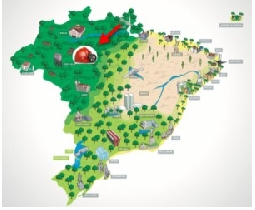
A controversial project to mine Brazil's vast indigenous territories in the Amazon, to be presented at the South American country's Congress in October, has revived a long-dragged confrontation among authorities, environmentalists and local communities.
The bill, which aims to revoke Brazil's indigenous groups "inalienable rights" over their lands, granted by the 1988 constitution, would allow mining in a vast area that covers nearly 13% of the country, or an area almost twice the size of Spain.
In an interview with local radio station Folha AM, Edio Lopes, the congressman who proposed the new regulation, said the country can no longer afford the lack of a mining law to control the production of a variety of minerals found in the area, including gold, iron ore, nickel, diamonds and rare earths.
Citing Australia as an example, Lopes said the proposed law could translate into important benefits for the Indians.
"The largest iron mine in an existing Aboriginal community in Australia, Rio Tinto's Tom Price, generates about $170 million in royalties a year, from which the local received 0.5%," he told Folha AM.
He added that aboriginals represent 9% of Rio Tinto's 25,000-strong workforce in Australia, where it is the largest employer of indigenous people.
Lopes's bill is a revamped version of a proposal presented to Brazil's Congress in 1996, which despite being approved by the senate but never passed the lower house.
Last month, the State Council on the Environment passed another controversy-charged ruling on gold mining in the Amazonas State. The decree, which limits but doesn't outlaw the use of mercury, has had scientists and activists up in arms since then.
According to Executive Secretary of the Brazilian Agency for Technological Development of the Mining Industry (ADIMB), Onildo Marini, the issue of logging the Amazon region for mineral exploration, is considerably less harmful than the use of mercury in gold mining.





